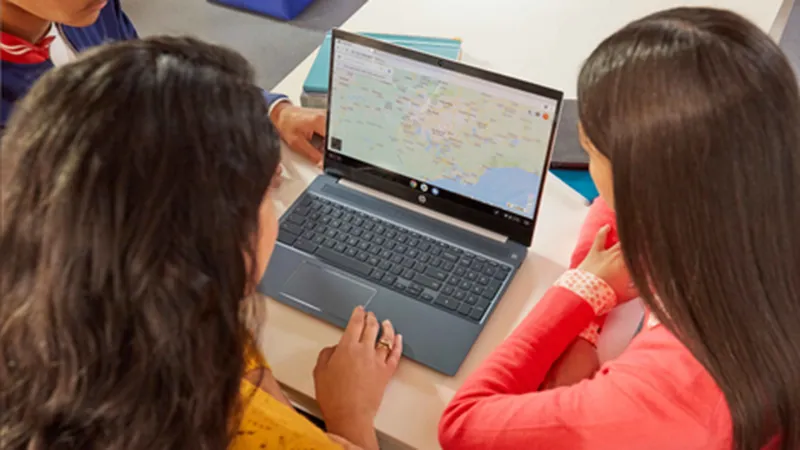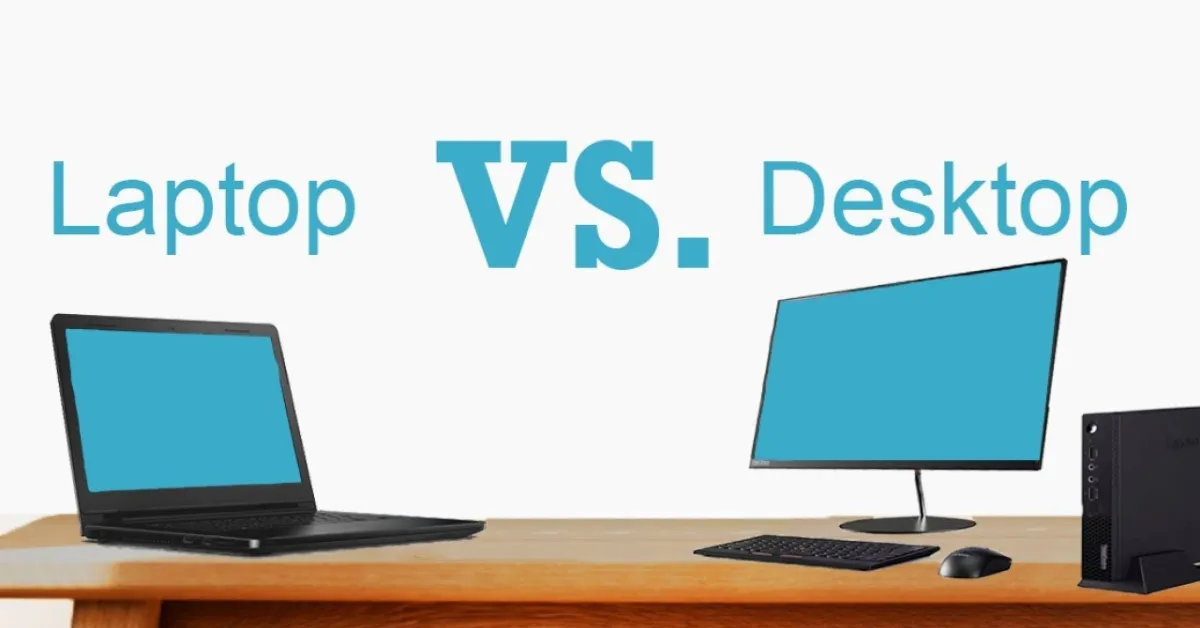You are running through campus to reach your 8 a.m. lecture with coffee at hand until you discover your course notes are on your computer. Carrying a desktop tower along with a monitor and keyboard, to class constitutes a ridiculous scenario. Sounds absurd, right? College students must pick between obtaining a laptop or desktop each day due to their different needs.
Students face an essential choice beyond buying basic features or lower cost because their device needs to comply with their hectic educational routine. The decision lies between choosing devices that focus on transport convenience or maximum capacity. Flexibility or affordability? We will separate the benefits from drawbacks and realistic usage policies to assist your choice. You will determine if purchasing a lightweight laptop suits you better than getting an efficient desktop system through this complete guide.
It is vital to understand the importance of device selection for the following explanation. Studies at college move beyond regular lecture attendance because students struggle to manage group work while studying through the night and handling their classwork-load alongside relaxation time. You will find your device partner for this journey, so ensure you choose wisely.
Why College Students Need the Right Device
The laptop or desktop serves as an essential tool for connecting to your digital life. Students’ choice of device usually decides whether they will succeed in their assignments or fail to meet deadlines because of slow performance.
Through my experience as a student who guided numerous classmates, I’ve observed that slow computers transform thirty-minute assignments into exhausting, time-consuming hours. You require a machine which offers these capabilities:
Common Student Needs:
Research & Assignments
- The process involves accessing academic journals, creating reports, as well as creating presentations alongside group work.
Online Classes & Video Conferencing
- Students need to use Zoom, Google Meet, and Microsoft Teams for their virtual classes.
Coding & Multimedia Projects
- Creatives handle tasks in graphic design combined with video editing while programming and animation work alongside them.
Entertainment & Gaming
- People use movies, streaming, and video games as their main leisure activities.
A wrong fit may reduce your work effectiveness while double payments result when you make purchases with the incorrect device. Data shows that 73% of students state that educational technology reliability determines their academic achievement (Educause 2022 study). This piece starts a detailed overview of available choices.
Advantages of Using a Laptop for College
Portability Rules
- Students consider laptops their essential multi-purpose technology tool. Their ability to work from the library and take notes in lectures makes them perfect student devices. No problem. Students can directly note down class content through their portable laptop during lectures. Done. A laptop has been helpful to me when editing team assignments while I was waiting for the university bus.
- Ultrabook, including the MacBook Air, Dell XPS 13, and other modern laptops, are lightweight at under 4 pounds, so they fit easily into backpacks without taking up extra space. This feature benefits students who need to move between their place of study and their residential area regularly.

Battery Life = Freedom
The modern laptop provides an estimated battery usage period of 8–12 hours. Students now have the luxury of avoiding power outlet searches in crowded lecture rooms. My previous HP Spectre managed to survive a long national flight and a three-hour waiting period, thus allowing me to complete my term paper.
All-in-One Convenience
A built-in webcam, microphone, and speaker hardware enable users to respond instantly to Zoom meeting requests—no extra gear is required. Microsoft Surface devices allow users to convert between laptop and tablet modes for note-taking and sketching purposes.
Real-World Win
When starting my freshman year, I selected a lightweight laptop as my main choice. This convenience saved me throughout my final examination period because I studied at coffee shops, friends’ dorms, and the school gym. — Sarah, Engineering Major
Disadvantages of Using a Laptop
Limited Performance
- Laptops do not perform equally well as desktop computers when users need to juggle multiple programs or run demanding tasks, such as video editing, 3D rendering, or gaming.
- The use of limited cooling systems results in overheating problems when laptops operate under extensive conditions and while performing demanding tasks.
Upgradability Constraints
- Upgrading RAM storage and GPU features on typical laptops presents significant installation difficulties to users.
- Replacing an outdated system means complete system replacement, which creates high expense and poor user convenience.
Ergonomics and Comfort
- User discomfort might increase after prolonged interaction with portable devices, which feature small displays along with limited keyboards.
- Using the device for lengthy periods requires the addition of accessories that include cooling pads along with ergonomic keyboards and external display units for better ergonomics and work efficiency.
Advantages of Using a Desktop for College
Powerhouse Performance
Desktops crush demanding tasks. Render a 3D model? Edit a documentary? No sweat. My roommate performed his architectural software application and listened to music on his desktop simultaneously without any delays. With components like NVIDIA RTX 4080 GPUs and Intel i9 processors, desktops outperform even premium laptops.

Customize Forever
The user can exchange graphics processing units and integrate additional storage capacity, in addition to modifying cooling components. A properly built desktop workstation has the potential to support university students from their first class until graduation. My cousin’s purchase of a new GPU for his 2018 desktop in 2022 resulted in financial savings exceeding $1,500 compared to getting a new laptop.
Ergonomics FTW
During thesis writing, I maintained proper posture because I used a 27-inch monitor and mechanical keyboard. Plus, gaming on a desktop? Chef’s kiss. Your body requires adjustable chairs, monitor arms, and split keyboards for a perfect workspace fit.
Cost Efficiency
For 1,000, a desktop outperforms a 1,500 laptop. You pay less for more power. Students seeking computer capabilities can achieve most requirements through a mid-range desktop combination of Ryzen 5 CPU and 16GB RAM without surpassing a 1,000-dollar budget.
Disadvantages of Using a Desktop
Lack of Portability
- Fixed workstations create restrictions because students find it impossible to move their work area from one location to another.
- The device proves ineffective for students who depend on attending regular classes because they need to write notes in transit.
Space Requirements
- A large and immobile setup requires an entire desk and a work area that is not suitable for cramped dormitory spaces or shared living arrangements.
- Active college dormitories along with shared housing lack sufficient space to properly set up a desktop workstation.
Additional Peripherals Needed
- Operation of this device demands four accessory components, including a monitor, keyboard, mouse, and speakers; thus, the setup becomes complex and expensive.
- The system requires a dedicated stationary workspace since it does not suit quick operating needs.
Laptop vs. Desktop: Key Comparison Factors
| Feature | Laptop | Desktop |
| Performance | Good for basic tasks, but limited for high-end work. | Powerful hardware for gaming and heavy applications. |
| Portability | Lightweight and travel-friendly. | Stationary setup—no mobility. |
| Customization | Limited; can only upgrade RAM/storage. | Highly upgradable—better long-term value. |
| Cost Efficiency | Expensive for high performance. | Cheaper for better performance. |
| Battery Life | Rechargeable, but drains over time. | Always plugged in—unlimited uptime. |
Tip: People who need portable devices should choose a laptop system. Students should purchase a desktop computer if they need impressive power capabilities along with future-proof returns on their investment. Choose your computer system after you analyze your needs, plus study conditions, and work responsibilities.
Who Should Choose a Laptop?
- Nomadic Students: stay between lectures, libraries, and other places in the school.
- The middle student group maintains a combination of academic writing together with computer browsing and everyday coding activities.
- Those who need space will face limitations in their typically small dormitory rooms.
- Students taking a combination of in-person and online courses should choose a laptop because it offers the flexibility needed to succeed in their program.
Pro Tip: For students with a tendency to meet mishaps check for MIL-STD certifications when searching for laptops.

Who Should Choose a Desktop?
- Those who use power-level hardware as professionals such as gamers and designers, along with those who use it for other purposes, fall into this category.
- Students who maintain a single study location need equipment that emphasizes comfort.
- The main goal for Budget Builders is to grow their device part-by-part throughout time.
- The high performance capabilities of commercial desktop computers provide essential advantages to content creators who stream or produce YouTube videos.
Tip: Students should consider combining a desktop PC with a basic Chromebook for taking notes during classroom sessions.
Real-Life Scenarios: What Students Say
- Emily decided to buy a desktop computer because she required superior performance capabilities for Adobe Photoshop and Illustrator applications. The larger display size combined with the ability to leave the computer stationary are among the benefits that draw me to this device.
- As a business major, Jake chooses a laptop because it suits his current needs. The device follows me to my educational sessions for note collection and enables online investigation anywhere I find myself.
- The affordable gaming laptop I purchased during the semester failed from overheating just before my final examinations. The laptop I used for study became worthless when it reached the last class. — Alex, Sophomore
Final Recommendation Laptop or Desktop
Choose a laptop if:
- You’re always on the move.
- You perform light to moderate work, which includes writing and browsing the web together with some light coding activities.
- Being able to choose convenience over pure power makes your priority list.
A suitable laptop requires at least 8GB RAM, an SSD drive, alongside an 8-hour battery duration.
Choose a desktop if:
- The requirements for gaming design or coding tasks require strong muscle computational power.
- You have a dedicated workspace.
- Your intention is to achieve savings through long-term upgrade potential.
Your goal should be to choose components like an RTX-3060 GPU and 16GB RAM while considering a plan for expansion.
FAQs
Can a laptop replace a desktop for gaming?
Users can buy the Razer Blade 15, among other high-end gaming laptops, although they will need to pay $2000+ upfront, given their larger size compared to Ultrabook.
Which is cheaper long-term?
Desktop computers improve their components instead of needing an entire system replacement. A desk setup will cost 30% less than purchasing two mid-range laptops throughout five years.
Should I consider a Chromebook?
You should get a Chromebook only when all your work is done in an internet browser. Chromebooks operate without the ability to execute software applications such as MATLAB or Adobe Suite.
The computing device spectrum offers both positive and negative characteristics for laptops compared to desktops. A laptop provides the most convenient option for users who need to move between locations. A desktop computer remains the optimal choice when you need maximum system power together with extended operational lifespan and personalization options. Your selection will depend on the requirements you have both for academics and personal needs.
What’s your choice? Let us know in the comments!
